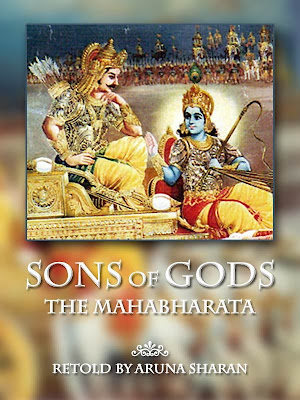Now in Print!
Sons of Gods is now available in Print -- at last!
It's available on Amazon and other retailers, in paperback. I've planned this for so many years -- I can't believe it's happened! And to celebrate, I have a new review, and a great one at that, by Shelley Schanfield a Goodreads member,
It's available on Amazon and other retailers, in paperback. I've planned this for so many years -- I can't believe it's happened! And to celebrate, I have a new review, and a great one at that, by Shelley Schanfield a Goodreads member,
There are many retellings of the Mahabharata, India's classic epic. I have read several and would recommend Sons of Gods for anyone not already familiar with this ancient tale.
Taken as a whole, the Mahabharata is unwieldy, to say the least. It is filled with digressions and stories within stories that resist linear narrative. Sharon Maas's version is admirably streamlined for readers who want to get a grounding in the basic story before exploring in more detail the rambling conglomeration of myths, legends, and history that make up this massive tale.
The greatest strength of Sons of Gods lies in its introduction to the complex Kuru-Pandava lineage. Understanding the complicated issues around the succession is key to understanding the tragic war between the two princely lines. Maas lays out the whole convoluted tale, from the grandfather Santanu to the grandsons Dhritarashtra and Pandu. Dhritarashtra, who is born blind, cannot rule. Pandu, the younger one, will inherit.
The princess Kunti serves the great sage Durvasa and because of her piety receives a boon from him. He teaches her a mantra that enables her to summon any god, and though she is warned not to use it lightly, she can't resist trying it. She summons the sun god Surya, and by him she bears a son. Her honor is at stake, however. Not daring to reveal she has borne a child she sets her little son afloat in a basket. Unlike Moses, who is rescued by a royal princess, a charioteer's wife finds Kunti's son. She and her husband, ignorant of his illustrious lineage, raise the child as their own , calling him Karna.
In due course, Kunti marries Pandu. Because of a curse (read the book if you want to know more!) Pandu is unable to father children on his wives Kunti and Madri. To ensure her husband's line, Kunti uses her mantra to summon the gods Dharma, Vayu, and Indra, who father sons on her. She allows Pandu's other wife to use the mantra to summon the Ashvins, twin gods who father Madri's twins. These sons of gods, who by ancient law of levirate become Pandu's heirs (the Pandavas), grow to manhood ignorant of their half-brother Karna just as he is ignorant of his lineage.
Maas's version goes straight and true from the early conflicts between the young Kuru and Pandava princes, who are raised in the same royal household, to the martial contest where an unknown charioteer's son Karna challenges the haughty Pandava prince Arjuna and becomes an ally of the Kurus, through the infamous game of dice to the Pandavas' thirteen year exile to the final war. I read avidly; didn't put it down, even though the ending was no mystery to me. It hits the most important events and illustrates the moral conflicts, but necessarily leaves out a great deal.
Maas's prose is lovely and descriptive. It also reflects the fact that the Mahabharata is a religious text as well as a ripping tale. For me, this sometimes renders the characters two-dimensional. Nevertheless, it's a very good read.



Comments